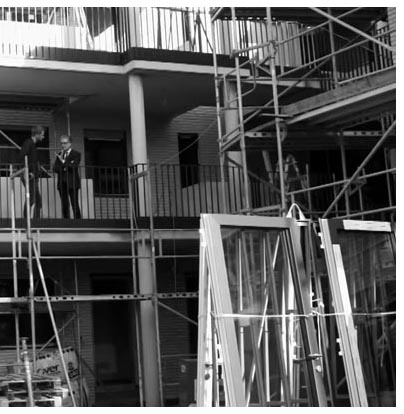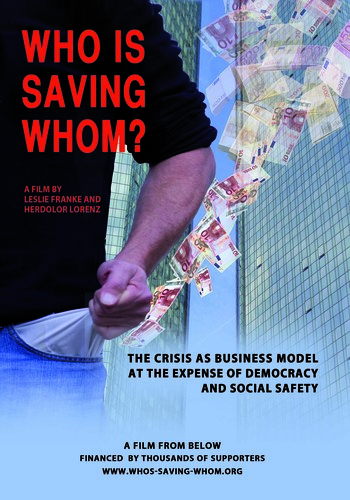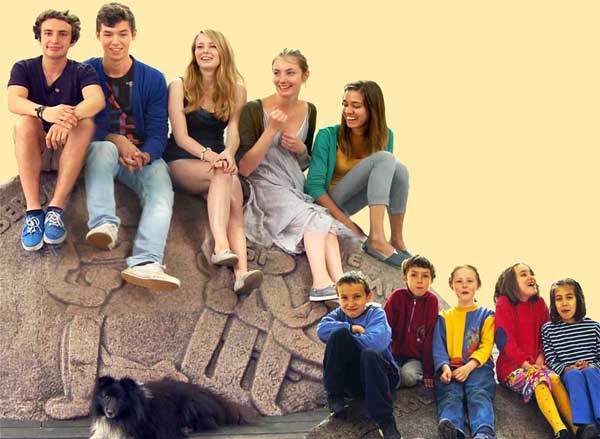SOLD CITY - When housing becomes a commodity
The new "FILMS FROM BELOW" by Leslie Franke and Herdolor Lorenz.
Help us to ensure that the premiere, with hundreds of film events, shows as many people as possible how we can put an end to housing speculation
- As one film: 124 min.
- As two parts: Part 1 – Property before human rights? / Part 2 – Expropriation instead of rent for profit. 102 min. each.
Since the non-profit status of housing has been abolished in Europe, housing is no longer considered a human right. Now the market decides where people live. How will the housing issue be decided in the 21st century? Using Berlin, Paris, Hamburg, Munich, London and Vienna as examples, "SOLD CITY" shows how those affected experience the real estate boom and what options there are to resist it.
For more than a decade, we have been experiencing a unique real estate boom in the world's metropolises. This has a mirror-image flip side: sharply rising rents. Income growth is no longer keeping pace. Low- and normal-income citizens are  threatened with displacement from sought-after inner-city locations. A turning point was reached when politicians in Europe decided to end the so-called " non-profit housing system”.
threatened with displacement from sought-after inner-city locations. A turning point was reached when politicians in Europe decided to end the so-called " non-profit housing system”.
It is no longer the social purpose of housing that is the most important aspect of housing policy, but the return on investment that housing generates. Yield is the profession of the rapidly expanding real estate groups. The real estate companies Vonovia and Deutsche Wohnen, but also LEG, ADO Properties, Covivio, Akelius, TAG Immobilien Grand City Properties, CDC Habitat and others dominate the housing market increasingly all over Europe. They make record profits that industries can't even dream of. The owners are anonymous pension funds and other investment funds from all over the world which - in search of profitable investment opportunities - discovered "concrete gold" for themselves after the 2008 financial crisis. The expectation of a return on investment is changing the urban landscape. It is not only in Paris and London that the city centers are visibly degenerating into a kind of museum for tourists and rich apartment owners. Neighborhoods that have evolved over time are being transformed into up-market very hip districts with the same expensive art and pub culture everywhere. Where working people stream in from the suburbs in the morning and disappear again at night because they can no longer afford the rents there.
"SOLD CITY" not only makes the dangers for urban culture visible. A new social question and an immense danger for democracy can be seen.
The film will explore the question of how people experience the real estate boom, where the rent increases come from and what possibilities there are to resist them. And last but not least, it will also be asked whether it is justified that land, which is finite, with its immense increases in value has been commoditized.
Here you can download the film SOLD CITY in two parts
MARKETABLE PEOPLE

MARKETABLE PEOPLE - When man becomes a commodity
Afilm by Leslie Franke and Herdolor Lorenz, 2020, 99 min.
"Marletable People " is a film from below. A film that concerns us all: "When man becomes a commodity" his human dignity is lost. Only 20 years ago, almost two thirds of the employees in Germany were in a full-time job with compulsory social insurance. Today only 38% are still doing so.
The filmmakers are going to the workplaces of the new models of capitalism such as the gig economy, such as work on demand. They meet people in work structures at universities or in long-term employment relationships in middle and upper management positions that were previously believed to be secure. And they observe how the intensification of competition is shifting more and more to the individual, which makes it very difficult to make room for social relationships that are sustainable in terms of solidarity. Depression and burnout make life hell for people who break down under this burden and insecurity. Even then, many still believe that they are to blame for their fate and are an individual case.
read more: www.marketable-people.org
Who Is Saving Whom?

The crisis as business model at the expense of democracy and social safety
Afilm by Leslie Franke and Herdolor Lorenz, 2015, 104 min.
„Who is saving whom?“ is not just another bank rescue and Euro rescue film. It reveals much more what it is that all the “rescues” hide, right up to the present day tragedy of Greece. The radical alteration of society in Europe. The transformation of private debt into public debt which has been papered over and presented as a “rescue” has not only driven democracy to absurdity. It has shaken societies which consider themselves socialist societies with rule of law to their foundations. No one formulates this better in the film than Mario Draghi, who as a one time vice president of Goldman Sachs and present president of he ECB steers the economies in the Euro area: “The European social model is history”. “Saving the Euro will cost a lot of money. That means we will have to take leave of the European social model”. For seven years now the rescue is taking place with the help of hundreds of Billions of public money.
read more: www.whos-saving-whomy.org
WATER MAKES MONEY
 How private companies make money with water
How private companies make money with water
A film by Leslie Franke and Herdolor Lorenz
A co-production of Kernfilm and La Mare aux Canards and Achille du Genestoux, in collaboration with AQUATTAC and ZDF/ARTE, supported by Filmförderung Hamburg-Schleswig-Holstein
Beside the air that we breathe, water is the most important commodity for mankind as well as for animals and plants. On July 27, 2010, access to clean water was incorporated into the Declaration of Human Rights by the UN General Assembly. And yet, water is increasingly subjected to business interests of private companies that are obligated to nobody except the well-being of their shareholders. This isn't merely a problem in third-world and developing countries. Wherever financially weak municipalities are seeking financial relief, the two of the world's largest water companies, VEOLIA and SUEZ, are knocking at their door. Together, the form a obtuse duopoly which for example provides water to about 80% of the population of France. The consequences: dramatically increasing costs for the consumers, lack of transparency and often also corruption. But the global players have been learning their lesson. They deny that they have anything to do with privatization. They give their new business models resonant names like "Public Private Partnership" or "Cross Border Leasing". But the impact has remained the same.
read more: www.watermakesmoney.org
H2O up for sale
When the main thing becomes minor matter
A film by Leslie Franke and Herdolor Lorenz
duration: 60 min
Usually, people only appreciate the most important goods when they are lacking. Water is an example.
We simply open the faucet and instantly our most important and most controlled good flows – reliable, cheap and ready to use. That this can't be necessarily taken for granted is not only true for the 'third world'. Susanne Baker lives in London, on the 5th floor of a building. The first thing she does in the morning is checking if water flows out of the faucet. If not, it's going to be a hassle. Maybe the neighbour on the third or the second floor has water ... The water supply in England was privatized in 1989. The maintenance of the pipes is too costly and not profitable. Thus, half of the drinking water seeps away in London's underground. The dilapidated supply lines that date from Victorian times tend to burst with regular water pressure. Therefore, Thames Water (RWE) lowered the pressure, and as a consequence the precious good is not able to always and everywhere rise to the higher floors. At the beginning of this year, it was announced that the pressure would be decreased by one more bar.
read more: H2O up for sale
The blue gold in the Garden of Eden
A film by Leslie Franke
If oil is a cause of war in the Middle East today, then it is going to be water tomorrow.
Opening film for a theme night water, by Leslie Franke, with Hermann Lorenz as co-author und producer. Arte /ZDF
Record viewing figures of 1,65 Mio. at Arte! Festivals: Ekotop Bratislava, Filmfest Florenz, Oekomedia Freiburg, ECOmove Berlin, Film21, Filmfestival für Nachhaltigkeit, Zürich, Green International Film Festival Taipei in Taiwan, Umweltfilmtage Bremen, festival.cinefeuille, Festival Slowakia.
Awards: „Europäischer Fernsehpreis 2003" of 20. ÖKOMEDIA in Freiburg, " Prize of Zavody Slovenskeho Narodneho povstania,Inc." of the 30. Int. Festivals EKOTOPFILM Bratislava, Slovakia, "Laudable Mention", ECOmove, Festival of Internat. Enviromental Films, Berlin 2003, Tour of Oekomedia through 16 German and Swiss cities, international sale to Japan, Finland und Slovenia, 2004 Grant Prix, Cinefuille, Gallic, 2005 Großer Preis des Mediterranen Wettbewerbs, Ecofilm, Athen,
Film presentations organized by : TU München, Attac, Nabu, Heinrich-Böll-Stiftung, Goetheinstitut Washington, „Brot für die Welt", Agenda 21
arte/ZDF, 59 Min., by Leslie Franke\ Produktion KernTV 2003
read more: The blue gold in the Garden of Eden
The children of St. Georg – a long-term documentary

Part 1: Early school years, 90 Min
Teil 2: Teenage years, 93 Min
- ·Small children and their worries which never appear 'small', because the film-makers take the position of the children so realistically and unfiltered throughout the whole film " Die Welt
- „A unique long term study – already now a cult movie" Hamburger Wochenblatt.
- „For the viewer, the trip through the multi-faceted world of children is worth it. This long term study is a unique gem in the media landscape of today. Filmbewertungsstelle Wiesbaden
- „The truly unbiased real life – pictures from the genuine life of people, something like this is hardly ever shown on TV. This unique long term documentary „The children of St. Georg" is one of those rare opportunities. Westdeutsche Allgemeine
- „A touching but nonetheless very funny story", le Monde
- „The way the children are shown is documentary in the best sense: observing instead of staged, reserved, not judgmental. As if someone had forgotten to press the stop button and afterwards is amazed by the hidden treasures on the tape. Hamburger Abendblatt.
- „At the end of the film it is hard to say goodbye to this group of children. This too is an achievement of the project: that it conveys real interest in a generation, that we consider not damaged, but at least precarious and at risk." FAZ
There are many films about children, but only a few long-term observations of adolescence. So far there hasn't been a film where children themselves describe their world and how it is changing. But now there is the film 'Children from St. Georg'.
Fall 1999, on the threshold to the new millennium: Tamim, Freya, Klara, Mitchel and Nevena start school in St. Georg, a central quarter of Hamburg near the central station. Sixteen different nations in the new class might surprise the viewer – but not the children. They are also used to junkies, but that is not really their world. The world they show us may appear trite and childish to some. But whoever is able to get into it will experience a world full of excitement and ups and downs.
German railways coming up for auction

A film by Herdolor Lorenz and Leslie Franke , 72 min, format: HDcam
„Why is it necessary that the the German railways is going public?", wonders Lucas Zeise, columnist of the Financial Times right at the start. And the film provides curious answers: so tax payers pay higher subsidies to the German railways, travelling by train becomes more expensive, the railroad network is reduced to a few ICE lines, and investors may barter railway property away.


